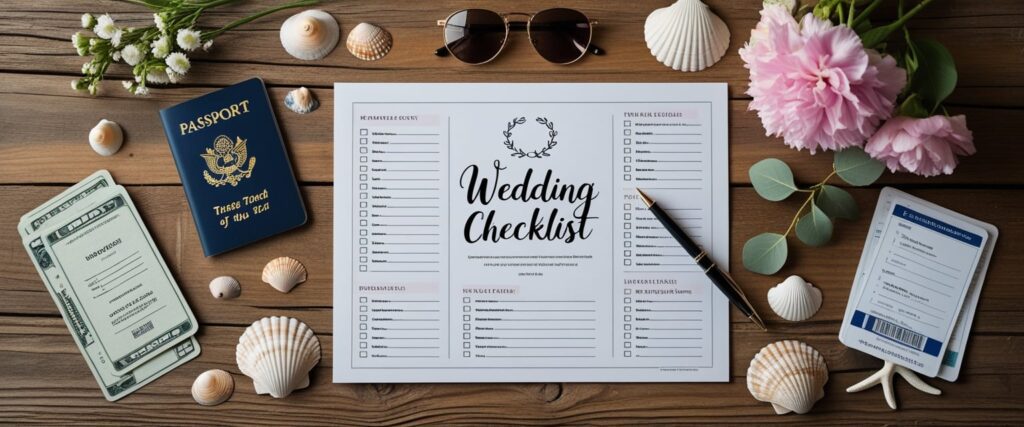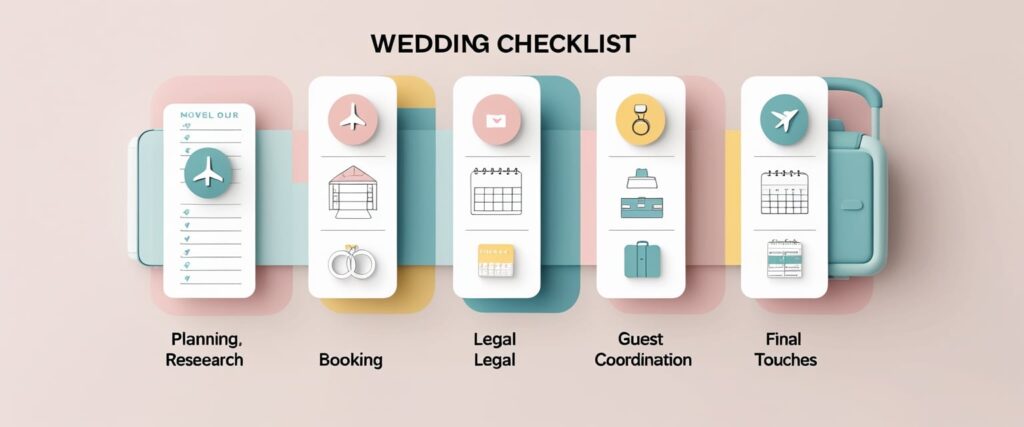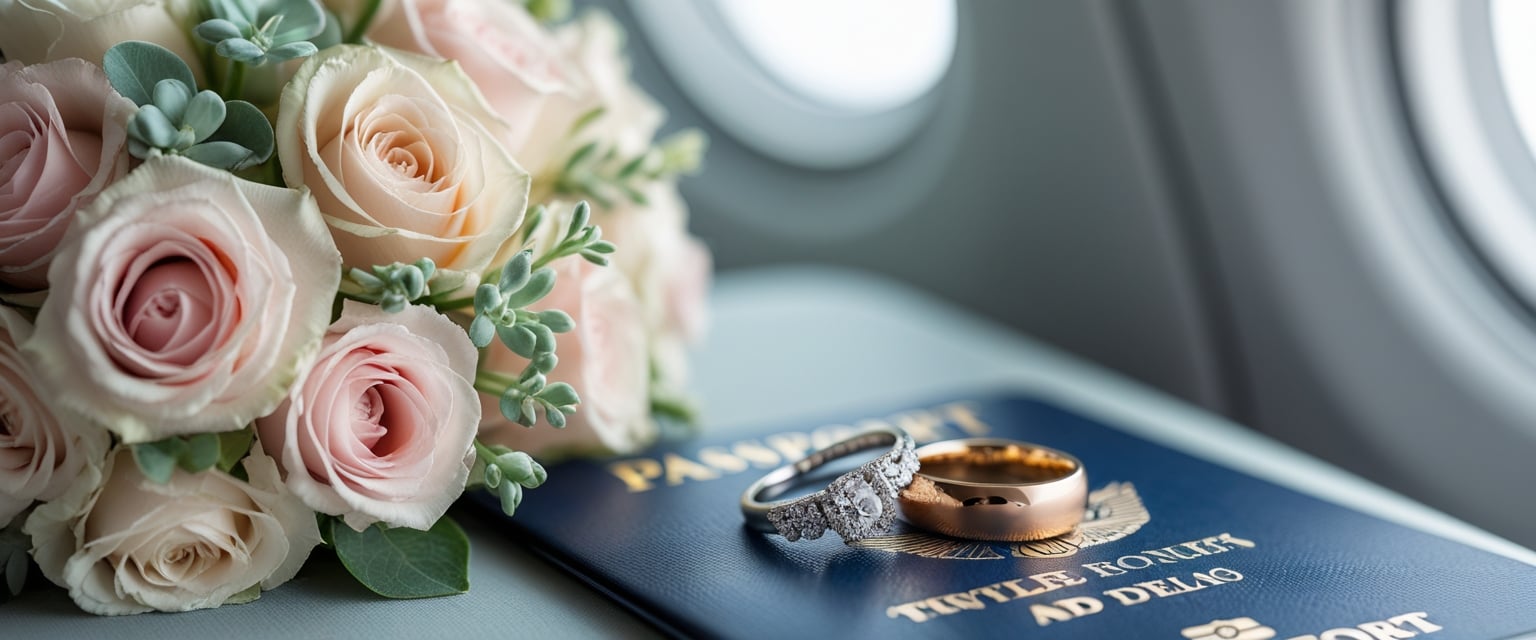A wedding destination checklist is a detailed plan designed to guide couples through every important step when organizing a wedding away from home. A step-by-step Wedding Destination Checklist is the ultimate guide to turning your dream wedding into a well-planned reality. It ensures nothing is overlooked, from choosing the perfect location to managing logistics like travel and legal requirements. This checklist provides structure and clarity, making complex destination wedding planning manageable and organized.

Every couple benefits from a destination wedding checklist because it helps them navigate unique challenges such as budgeting, vendor coordination, and guest management in unfamiliar settings. The checklist covers essential topics including selecting the ideal venue, understanding legal obligations, preparing travel arrangements, and packing crucial items. Comprehensive guidance on seasonal trends, local customs, and final wedding day preparations keeps the planning process efficient and stress-free. By following a Wedding Destination Checklist, you can avoid last-minute stress and ensure nothing is overlooked.
In addition, the checklist includes tools for visual inspiration and useful resources to support decision-making. By following this step-by-step framework, couples can ensure their destination wedding reflects their vision while staying on schedule and within budget. The article breaks down each element in detail to assist couples in creating a seamless, memorable celebration.
Table of Contents
What Is a Wedding Destination Checklist?
A wedding destination checklist is a structured plan covering all necessary tasks for organizing a wedding away from home. It ensures proper timing, budget management, legal compliance, and coordination of travel and vendors. Using such a list helps couples avoid overlooked details and last-minute issues, streamlining complex preparations.

Why Every Couple Needs One
Destination weddings involve extra complexities such as international travel, varying legal requirements, and managing guests from different locations. Without a checklist, couples can easily miss deadlines, important documents, or vendor bookings.
A checklist also helps distribute responsibilities, improves organization, and reduces stress. It provides a clear roadmap, making sure tasks like booking flights, securing accommodations, and confirming permits get done on time.

Having a detailed, personalized checklist supports smoother communication with vendors and venues, maintaining clarity on what is expected and when. This is crucial to adapting to unfamiliar locations and varying customs.
Step-By-Step Wedding Destination Checklist
A step-by-step checklist breaks down planning into manageable phases:
- Initial Planning: Choose the destination, define the budget, draft a guest list.
- Research: Investigate venues, vendors, local regulations, and accommodation options.
- Booking: Reserve venues, travel arrangements, and lodging well in advance.
- Legal & Documentation: Apply for marriage licenses, gather passports, and understand local marriage laws.
- Guest Coordination: Share travel details, manage RSVPs, and arrange group activities.
- Final Preparations: Confirm all bookings, organize packing lists, and schedule rehearsals or welcome events.

Following these stages prevents last-minute oversights and maintains steady progress.
Choosing Your Dream Destination: Factors and Top Locations
Selecting a wedding destination involves balancing dream elements with practical concerns. Key factors include:
- Accessibility: Ease of travel for the couple and guests.
- Budget: Costs for venue, accommodation, and local services.
- Climate: Seasonality and weather conditions that suit the wedding style.
- Legal Requirements: Marriage regulations that can vary widely between countries.
- Amenities: Availability of reliable vendors and support services.

Popular destination types include tropical beaches, historic European cities, mountain retreats, and charming villas. Each location offers unique settings and logistical considerations.
Budgeting for a Destination Wedding
Budgeting requires detailed estimates for all major components:
| Expense Category | Considerations |
|---|---|
| Travel & Accommodation | Flights, hotel blocks for guests, transport |
| Venue & Vendors | Rental fees, catering, photography, entertainment |
| Legal & Documentation | Marriage licenses, translators, officiants |
| Attire & Packing | Dress fittings, luggage fees, local climate gear |
| Miscellaneous | Wedding favors, welcome events, contingency fund |

Allowing flexibility for currency fluctuations and unexpected expenses is essential. Splitting costs with guests or remote arrangements can help manage the financial load. Tracking expenses regularly ensures the budget stays on target.
Destination Wedding Planning Essentials
Planning a destination wedding involves many specific considerations, from legal requirements to travel logistics. Each element demands attention to detail and careful organization to ensure the event runs smoothly and stays within budget.
Legalities, Documents, and Guest Management
Understanding the legal requirements of the wedding location is critical. Couples must research marriage laws, including residency requirements, paperwork, and necessary permits well in advance. Common documents include passports, birth certificates, and affidavits of eligibility to marry.

Guest management involves communicating travel details, accommodations, and itinerary clearly. Creating a centralized system like a wedding website or app can help manage RSVPs, travel arrangements, and special needs. Couples should also consider group travel discounts and lodging options to ease their guests’ planning.
Venue and Vendor Selection: Research Tips
Choosing the right venue sets the tone for the wedding. Couples should prioritize accessibility, capacity, and included amenities when evaluating options. Site visits or virtual tours provide valuable insights into the space’s suitability and logistical challenges.

For vendors like caterers, photographers, and florists, local recommendations and reviews are vital. Contracts should specify services, costs, and cancellation policies. Early booking is crucial, especially in high-demand destinations or peak seasons.
Visual Inspiration: Galleries, Images, and Videos
Visual research helps clarify style preferences and align expectations. Browsing professional wedding galleries or location-specific portfolios can inspire décor, attire, and photography choices.

Couples should save and organize images in folders or boards by category. This method aids communication with vendors and venue planners, ensuring everyone shares a cohesive vision.
Travel Logistics and Planning for Guests
Coordinating travel can be complex, especially for international weddings. It’s important to provide guests with clear transportation options, local accommodations, and visa information if required.

Consider arranging group transportation or recommending trusted services for airport transfers. Including detailed travel itineraries and emergency contacts in an information packet can reduce stress for guests.
Packing and Essentials for Your Destination Wedding
Couples must pack carefully, balancing formal attire and essentials specific to the destination’s climate. This includes wedding outfits, shoes, and accessories, plus backup items like extra makeup, weather-appropriate gear, and first-aid supplies.

It’s helpful to prepare a packing checklist and ship bulkier décor or equipment to the venue ahead of time. Carry-on bags should include important documents and valuables.
Pro Tips: Seasonality, Style, and Local Flavours
Timing affects cost, weather, and availability. Choosing the right season can enhance the experience and reduce expenses. Researching local climate patterns helps avoid unexpected weather problems.

Incorporating local traditions, cuisine, and décor adds authenticity to the celebration. Couples should balance cultural elements with personal style for a tailored atmosphere.
Wedding Day Timeline and Final Checks
A detailed timeline organizes the day from setup to the last dance. It should include vendor arrival times, ceremony schedule, and contingency buffers for delays.

Final checks involve confirming vendor bookings, verifying legal paperwork, and reviewing guest lists. Designating a point person for on-site coordination reduces pressure on the couple.
Internal Links: Helpful Guides and Additional Resources
Providing access to related planning guides enhances preparedness. Recommended topics include budgeting templates, etiquette advice, and destination-specific guides.

Links to previous articles or curated lists support deeper understanding and informed decision-making.
External Resource: Planning Tools and Expert Strategies
Professional tools like planning apps, budget calculators, and checklist downloads streamline the process. Expert advice from wedding planners or destination specialists offers practical solutions for common challenges.

Utilizing these resources helps couples stay organized, track progress, and avoid pitfalls.
Conclusion and Call to Action
Couples benefit from starting early and using comprehensive checklists and expert resources. Taking a step-by-step approach ensures that no detail is overlooked and the destination wedding is both memorable and manageable. From booking flights to securing vendors, a Wedding Destination Checklist covers all essential steps for a seamless celebration.
FAQs About a Wedding Destination Checklist
1. What should be included in a wedding destination checklist?
A comprehensive wedding destination checklist should cover venue booking, travel arrangements, guest coordination, legal requirements, vendor contracts, packing essentials, and final-day preparations. Including these ensures smooth planning and reduces last-minute stress.
2. When should couples start planning their destination wedding?
Ideally, couples should begin planning 12–18 months in advance. This timeline allows enough time to secure the venue, book travel at better rates, complete legal paperwork, and give guests plenty of notice for international travel.
3. How do you manage guests for a destination wedding?
Guest management can be simplified by creating a wedding website or app where couples share travel details, accommodations, RSVPs, and schedules. Offering group bookings for flights or hotels also helps reduce costs and ensures smooth logistics for everyone attending.
4. Do all countries have the same marriage laws for destination weddings?
No, marriage laws vary significantly by country. Some destinations require residency periods, affidavits, or specific documents. Couples should always confirm legal requirements with local authorities or consult a destination wedding planner to avoid complications.
